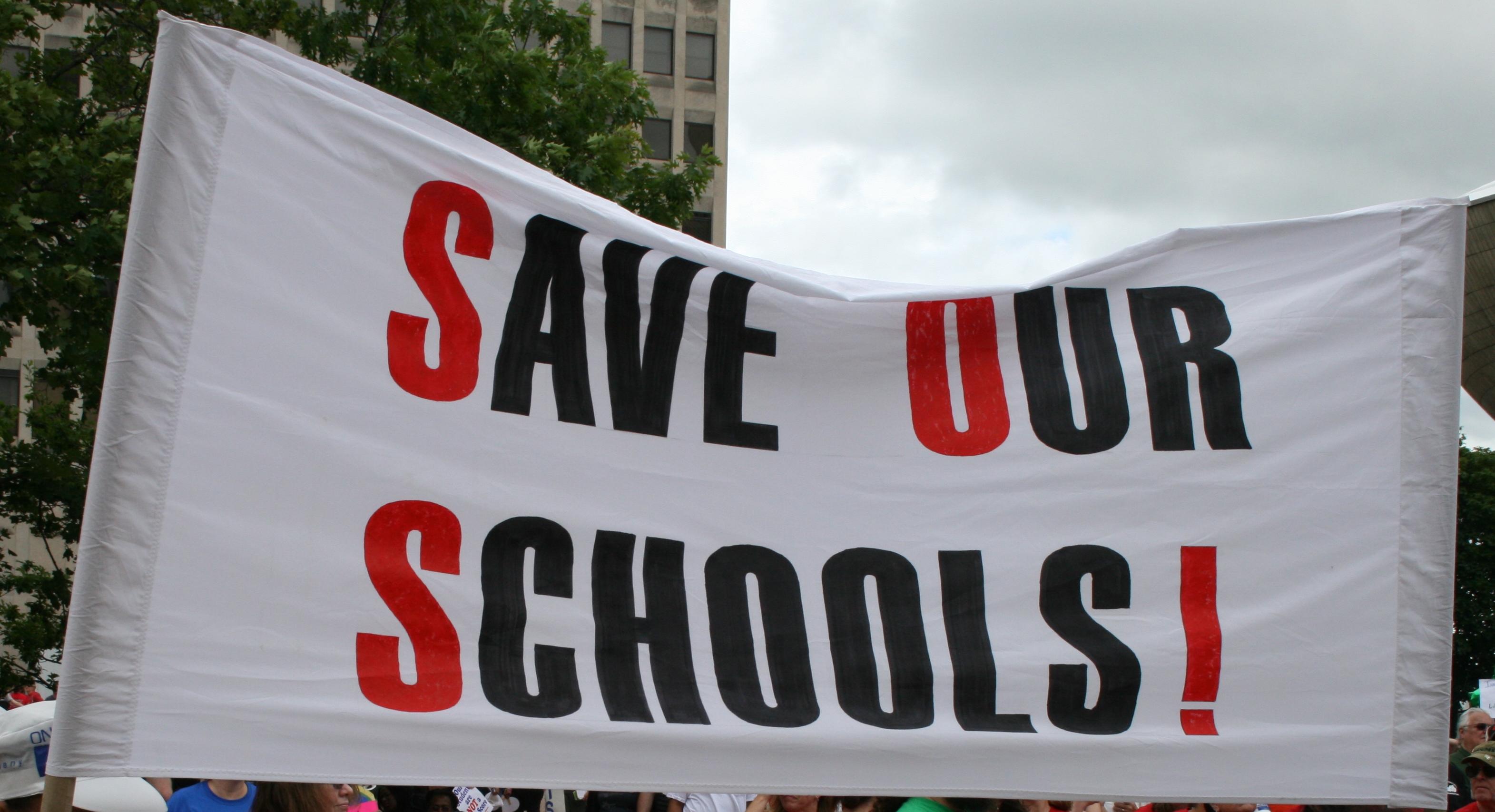Public education has long been the cornerstone of American democracy. Our founding fathers emphasized the importance of educating all citizens to preserve a free nation. George Washington highlighted the necessity of educating the nation’s youth, calling them the “future guardians of the liberties of the country.”
Despite their differing political views, both Thomas Jefferson and John Adams agreed that the United States has a responsibility to educate all of its citizens. Jefferson argued for a general education system “without regard to wealth, birth, or other accidental condition or circumstance.” Dismantling public education would pave the way to tyranny and undermine the very foundation of democracy.
Unfortunately, an organized effort to disband public education in our country is currently in motion. The Heritage Foundation, a conservative think tank, is actively promoting the erosion of public education through its manifesto, Project 2025. The document is filled with terms like “freedom” and “choice”, but its implementation would lead to the exact opposite of those ideals.
Let’s eamine some of the key components of Project 2025 and their implications for public education.
• The Elimination of the U.S. Department of Education
One of the core recommendations of Project 2025 is the dissolution of the U.S. Department of Education (DOE), the only federal agency dedicated exclusively to children’s education. The DOE’s primary goal is to ensure equal educational opportunities for all individuals, regardless of their background or circumstances. Without this agency, there would be no national oversight to guarantee that students across the country have access to a high quality, equitable education.
Eliminating the DOE would create a vast educational divide, leaving only the wealthiest families with the means to afford quality schooling. Critical funding programs like Title I, which provides financial assistance to schools serving low-income students, would disappear. Without Title I, many schools that rely on this funding to deliver basic educational services would struggle to remain open.
Programs like Head Start, which offers early education and childcare services to low-income families, would also be dismantled. Families of children with disabilities would be disproportionately affected, as would low-income households. Additionally, the increased demand for childcare slots in the absence of public services would drive up costs for everyone, making childcare unaffordable for most middle and lower income families.
• Defunding Special Education
Project 2025 also targets the Individuals with Disabilities Education Act (IDEA), a critical source of funding for special education programs. IDEA ensures that students with disabilities receive appropriate services to support their learning and development. Without federal funding, these programs would be gutted, and the students who rely on them would suffer.
Losing IDEA support would place the financial burden of special education on states and local governments, which would likely struggle to maintain even a fraction of the services currently provided. Many states would be forced to raise taxes to fill the funding gap, further straining families already grappling with economic challenges.
• School Vouchers
Another cornerstone of Project 2025 is the promotion of school voucher programs. The idea behind vouchers is that parents could use public tax dollars to send their children to a school of their choice, including private and religious institutions. While this sounds appealing, the reality is more troubling.
Voucher programs would divert essential funding away from public schools, undermining the primary source of financial support for public education. Wealthier families with higher tax vouchers would have more educational options, while low-income families would be left with fewer choices, further exacerbating the existing educational disparities. Additionally, private schools that accept vouchers can still reject students, particularly those with special needs, leaving some families without any viable options for their children’s education.
Evidence from states that have implemented voucher systems illustrates the harm they can cause. Ohio’s “EdChoice” voucher program, for example, has been subject to government investigations for allowing voucher funds to support homeschooling environments that promote extremist ideologies, including neo-Nazi propaganda. Furthermore, lax regulations have led to taxpayer dollars being used for noneducational expenses, such as private ski lessons, golf equipment, and even Disney World tickets.
State budgets have also suffered due to the unanticipated costs of voucher programs. In Arizona, the cost of the voucher system ballooned by more than 1,356% over initial projections. Florida’s voucher program exceeded its estimated costs by 519%. These skyrocketing expenses deplete the public funds, putting both public schools and state budgets at risk.
Project 2025 would use government funds to create further inequality in education, particularly harming the most underserved students. The expansion of vouchers and the elimination of federal oversight would result in the decline of public schools, leaving the most vulnerable children without access to the education they so crucially need to succeed. The deepening disparities in educational opportunities would entrench cycles of poverty, consolidate power among the wealthy, and weaken the overall strength of our nation.
At its core, Project 2025 is a threat to the principles of equity, opportunity, and democracy that public education represents. As Americans, we must recognize that the tenets of Project 2025 are not in the best interest of children, families, or the future of our nation. Rather than strengthening education, these proposals would dismantle it, leaving a system that only benefits the privileged while abandoning the needs of the majority.
Public education is essential to the health of American democracy. The proposals outlined in Project 2025 threaten to undermine that foundation by defunding schools, dismantling federal protections and perpetuating inequality. Parents, educators and all concerned citizens must stand against these policies to preserve a public education system that serves everyone, not just the wealthy few.
Sources:
- https://firstfocus.org/resource/project-2025-would-destabilize-public-education/
- https://firstfocus.org/update/alliance-for-student-liberty-the-problem-with-arizonas-school-voucher-program/
- https://time.com/5891261/early-american-education-history/
- https://www.sosaznetwork.org/2023/public-schools-the-keystone-of-democracy/
- https://www.americanprogress.org/article/project-2025s-elimination-of-title-i-funding-would-hurt-students-and-decimate-teaching-positions-in-local-schools/
- https://www.americanprogress.org/article/project-2025-would-eliminate-head-start-severely-restricting-access-to-child-care-in-rural-america/
- https://ohiocapitaljournal.com/2023/02/09/as-some-lawmakers-debate-nazi-home-schooling-scandal-others-propose-expanding-vouchers/

